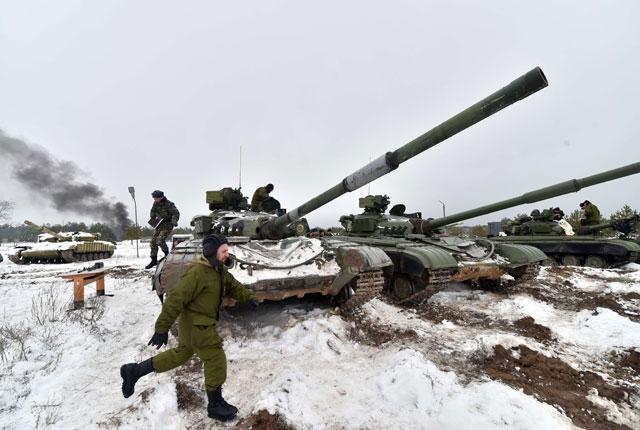You are here
Battle rages for town where Ukraine rebels reject ceasefire
By Reuters - Feb 16,2015 - Last updated at Feb 16,2015
VUHLEHIRSK, Ukraine — Pro-Russian rebels pounded encircled Ukrainian government forces on Monday and Kiev said it would not pull back heavy guns while a truce was being violated, leaving a European-brokered peace deal on the verge of collapse.
The European Union kept pressure on Russia and the rebels by announcing a new list of separatists and Russians targeted with sanctions, to which Moscow promised an "adequate" response.
Fighting subsided in many parts of eastern Ukraine under a ceasefire that came into force on Sunday, under the deal reached last week in marathon talks involving the leaders of France, Germany, Russia and Ukraine.
But the truce appears to have been stillborn in the town of Debaltseve where the most intensive fighting has taken place in recent weeks.
"The situation is fragile," said German Chancellor Angela Merkel, the driving force behind the deal reached on Thursday after all-night talks in the Belarussian capital Minsk.
"It was always clear that much remains to be done. And I have always said that there are no guarantees that what we are trying to do succeeds. It will be an extremely difficult path," she told reporters in Berlin.
Rebels said soon after it came into effect that they had no intention of observing the ceasefire at Debaltseve, where they have been advancing since January and now have a Ukrainian unit all but encircled.
Washington says the rebel operation around the town, which sits on a strategic railway hub, is being assisted by the Russian armed forces, which Moscow denies.
Reuters reporters near the front said Debaltseve was being relentlessly bombarded with artillery. At least six tanks as well as armoured personnel carriers and artillery could be seen in woods near Vuhlehirsk, 10km west of Debaltseve, which the rebels captured a week ago.
Military trucks headed along the main road in the direction of the town to regular bursts of shelling and the firing of Grad rockets and machine guns.
"You can hear there is no ceasefire," said a rebel fighter with a black ski mask who gave his name as Scorpion, his nom de guerre, and blamed the fighting on Kiev's forces. "Debaltseve is our land. And we will take Debaltseve."
Stalemate over withdrawal of big guns
A rebel commander, Eduard Basurin, said Ukrainian troops had violated the ceasefire 27 times in the past 24 hours.
Kiev said its forces had been shelled more than 100 times in eastern Ukraine since the truce took effect, five of its servicemen had been killed and 25 wounded, and that it could not carry out an agreement to pull back big guns in such conditions.
"The pre-condition for withdrawal of heavy weapons is fulfilling Point One of the Minsk agreements — the ceasefire. One hundred and twelve attacks are not an indicator of a ceasefire," said a Kiev military spokesman, Andriy Lysenko.
A rebel leader, Denis Pushilin, responded by saying his forces were "only ready for a mutual withdrawal of equipment".
In another complication likely to set back hopes of peace, he and another separatist leader said the rebels would pull out of the Minsk agreements if Kiev made any further moves to abandon Ukraine's neutral status — also a red line for Moscow, which fears Ukraine might seek to join the NATO alliance.
The separatists offered the Ukrainian forces a safe corridor out of Debaltseve if they gave up their weapons but a military spokesman for Kiev, Vladislav Seleznyov, ruled this out.
"There are the Minsk agreements, according to which Debaltseve is ours. We will not leave," he said.
Only a glimmer of hope
Fighting began in east Ukraine after the overthrow of a Moscow-backed president in Ukraine last February and Russia's annexation of the Crimea peninsula a month later.
The West says Putin, who has called parts of Ukraine "New Russia", has sent troops and weapons to back the rebels. Moscow denies this and accuses the West of waging a proxy war in Ukraine to seek "regime change" in Russia.
Hopes that Thursday's deal will end a conflict that has killed more than 5,000 people have been dampened by the collapse of an earlier truce when rebels advanced last month.
Western countries say they reserve the option of expanding economic sanctions on Moscow over the crisis, hoping a growing financial crisis in Russia will persuade Putin to use his influence with the rebels to stop the fighting. But some fear he wants the conflict to fester for years so that Kiev cannot control east Ukraine and Russia can retain influence there.
The EU's new list of 19 people and nine organisations hit by asset freezes and travel bans was dominated by Ukrainian separatists but also targeted popular Russian singer Iosif Kobzon, sometimes dubbed Russia's equivalent of Frank Sinatra, and two Russian deputy defence ministers.
"One thing is clear — the decision, which will be followed by an adequate response, runs contrary to common sense and will not help efforts to find a solution to the inter-Ukrainian conflict," the Russian foreign ministry said.
Related Articles
After weeks of relentless fighting, the embattled Ukrainian rail hub of Debaltseve fell Wednesday to Russian-backed separatists, who hoisted a flag in triumph over the town. The Ukrainian president confirmed that he had ordered troops to pull out and the rebels reported taking hundreds of soldiers captive.
Pro-Russian rebels appeared to be in full control on Wednesday of one of the towns that has been a principal target of their advance, as they attempt to surround a nearby garrison of Ukrainian forces.
Ferocious fighting raged in Ukraine on Saturday, threatening a ceasefire deal as Kiev and the US accused Russia of fuelling a rebel onslaught to grab territory hours before the truce began.



















